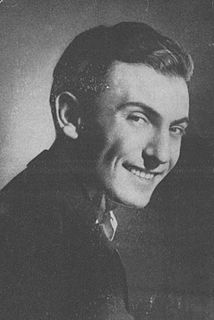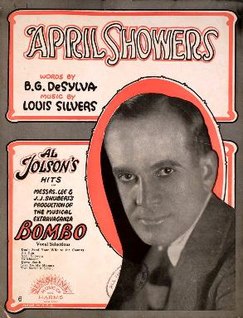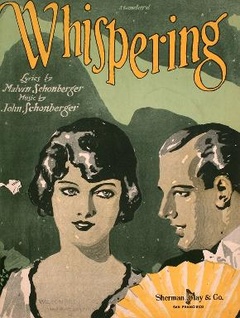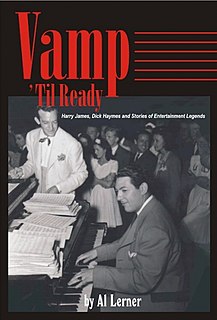Related Research Articles

Edwin Frank Duchin, commonly known as Eddy Duchin or alternatively Eddie Duchin, was an American jazz pianist and bandleader during the 1930s and 1940s.

Vincent Lopez was an American bandleader, actor, and pianist.
"Blue Room" is a show tune from the 1926 Rodgers and Hart musical The Girl Friend, where it was introduced by Eva Puck and Sammy White. It is also a jazz standard.

Carmen Cavallaro was an American pianist. He established himself as one of the most accomplished and admired light music pianists of his generation.

The Eddy Duchin Story is a 1956 Technicolor film biopic of band leader and pianist Eddy Duchin. It was directed by George Sidney, written by Samuel A. Taylor, and starred Tyrone Power and Kim Novak. Harry Stradling received an Academy Award nomination for his cinematography in the CinemaScope film. The film received four nominations in total and was one of the highest-grossing films of 1956. Incorporating signature elements of Duchin's style into his own original style, Carmen Cavallaro performed the piano music for the film.
Shine is a popular song with lyrics by Cecil Mack and Tin Pan Alley songwriter Lew Brown and music by Ford Dabney. It was published in 1910 by the Gotham-Attucks Music Publishing Company and used by Aida Overton Walker in His Honor the Barber, an African-American road show. According to Perry Bradford, himself a songster and publisher, the song was written about an actual man named Shine who was with George Walker when they were badly beaten during the New York City race riot of 1900.
"I Only Have Eyes for You" is a romantic love song by composer Harry Warren and lyricist Al Dubin, written for the film Dames (1934) when Dick Powell introduced it. Several successful recordings of the song were made in 1934 and later there were charted versions by The Flamingos (1959) and Art Garfunkel (1975).
"Pennies from Heaven" is a 1936 American popular song with music by Arthur Johnston and lyrics by Johnny Burke. It was introduced by Bing Crosby with Georgie Stoll and his Orchestra in the 1936 film of the same name. It was recorded in the same year by Billie Holiday and afterwards performed by Doris Day, Arthur Tracy, Tony Bennett, Dinah Washington, Clark Terry, Big Joe Turner, Lester Young, Dean Martin, Gene Ammons, The Skyliners, Legion of Mary, Guy Mitchell, and Harry James.
Leo F. Reisman was an American violinist and bandleader in the 1920s and 1930s. Born and reared in Boston, Massachusetts, United States, he was of Jewish ancestry; from German immigrants who immigrated to the United States in the 19th century. Inspired by the Russian-American violinist Jascha Heifetz, Reisman studied violin as a young man. After being rejected by the Boston Symphony Orchestra, he formed his own band in 1919. He became famous for having over 80 hits on the popular charts during his career. Jerome Kern called Reisman's orchestra "The String Quartet of Dance Bands".

"The Nearness of You" is a popular song written in 1938 by Hoagy Carmichael with lyrics by Ned Washington. The song debuted in the 1938 movie Romance in the Dark.
"Only Forever" is a song popularized in 1940 by Bing Crosby. It reached number one on the Billboard charts on October 19, 1940 and spent nine weeks in that position during a 20-week stay in the charts. "Only Forever" was written by James V. Monaco and Johnny Burke for the 1940 film Rhythm on the River and the song was nominated for the Academy Award for Best Original Song.
"Let's Fall in Love" is a song written by Harold Arlen (music) and Ted Koehler (lyrics) for the film Let's Fall in Love and published in 1933. In the film, it is heard during the opening credits and later sung by Art Jarrett and chorus, and by Ann Sothern.
"Hold Me" is a popular song by Jack Little, Dave Oppenheim, and Ira Schuster. The song was published in 1933; it was recorded by co-writer Little, and covered by Eddy Duchin, Greta Keller and Ted Fio Rito.

"April Showers" is a popular song with music written by Louis Silvers and lyrics by B. G. De Sylva. First published in 1921, it is one of many popular songs whose lyrics use a "Bluebird of happiness" as a symbol of cheer.
"Snuggled on Your Shoulder " is a popular song with music by Carmen Lombardo and lyrics by Joe Young, published in 1932.
The music soundtrack of the BioShock series is composed of licensed music from the 1930s, 1940s, and 1950s, as well as an original orchestral score by Garry Schyman.

"Whispering" is a popular song. "Whispering" was first published in 1920 by Sherman, Clay & Co., of San Francisco. The initial 1920 copyright and first publishing attributes the lyrics to Malvin Schonberger and the music to John Schonberger.

George Greeley was an Italian-American pianist, conductor, composer, arranger, recording artist and record producer who is known for his extensive work across the spectrum of the entertainment industry. Starting as an arranger and pianist with several notable big bands in the 1940s, he segued into the Hollywood radio scene, working on several nationally broadcast variety programs. After conducting an Army Air Force Band during World War II, he was hired by Columbia Pictures as a staff pianist and orchestrator. He worked as pianist on several hundred motion pictures, worked with many famous composers orchestrating their soundtrack compositions, and created original compositions of his own in several dozen movies. It was Greeley's hands that performed the piano parts that Tyrone Power mimed in The Eddy Duchin Story. Concurrent with his work at Columbia Pictures, George Greeley also worked at Capitol Records as music director, pianist, and conductor for many artists such as Gordon MacRae, Jane Powell, Jo Stafford, Frankie Laine, and Doris Day. He was hired in the late 1950s by the newly established Warner Brothers Records. George Greeley arranged, orchestrated and performed as primary artist for a series of hit recordings entitled "Popular Piano Concertos." As music tastes changed in the late 1960s, Greeley had already moved into television, composing themes and music for popular TV series like My Favorite Martian,The Ghost and Mrs. Muir,Nanny and the Professor, and Small Wonder. He performed as featured piano soloist and as guest conductor in concert appearances around the world. He died from emphysema at age 89 in Los Angeles, California.

Al Lerner was an American pianist, composer, arranger, and conductor from the big band era. He was a member of the Harry James band for many years, playing piano. He wrote music for several artists, including Allan Sherman and Liza Minnelli. He also wrote the music for "So Until I See You", the closing theme for The Tonight Show with Jack Paar in the early 1960s, and was the pianist for A Tribute to Eddie Duchin, which was a soundtrack for the 1956 biographical film pic The Eddy Duchin Story.
The Hit Parade is a 1937 American musical film directed by Gus Meins and written by Bradford Ropes, Samuel Ornitz and Harry Ruskin. The film stars Frances Langford, Phil Regan, Max Terhune, Edward Brophy, Louise Henry and Pert Kelton. The film was released on April 26, 1937, by Republic Pictures. Republic later reissued the film in 67 minute length as I'll Reach for a Star.